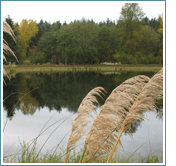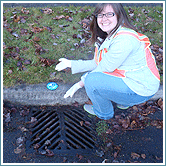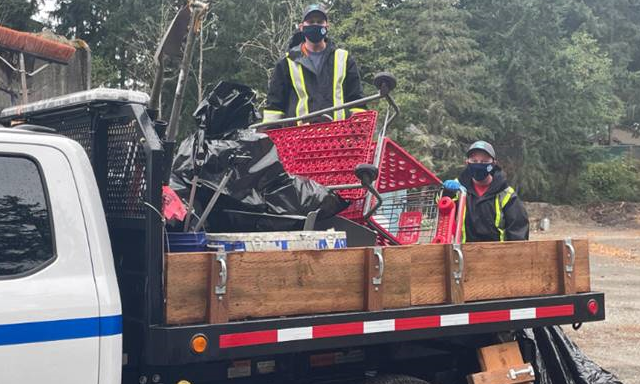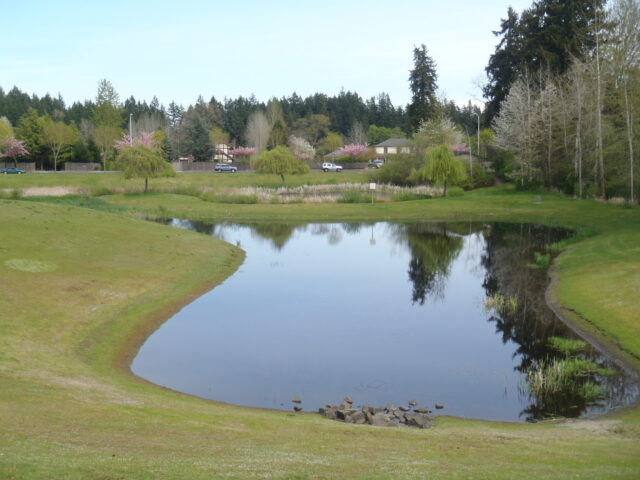Storm and Surface Water Program
WATER RESOURCES
Stormwater Utility Programs & Activities

The City of Lacey created a stormwater utility in January 1985 due to the increasing importance of managing stormwater and surface water. This utility performs the duties necessary to comply with State and Federal regulations associated with surface water drainage.
Lacey’s Stormwater Utility plans, constructs, improves, operates and maintains an extensive system of public stormwater facilities located throughout our community. City crews currently maintain a drainage system of more than 6,150 catch basins and more than 90 miles of storm drain pipe. These facilities, which are typically located within the City streets we all use, require continual maintenance and improvement. The storm system drains to more than 50 regional stormwater ponds, which also require regular maintenance and periodic renovation.
To learn about even more public services that are provided by Lacey’s Storm and Surface Water Utility through the Water Resources and Operations divisions of the City of Lacey Public Works Department browse the links below and view the List of Lacey Storm and Surface Water Utility Services.
Help Keep Pollutants Out of Our Waterways
Storm drains lead to our rivers, lakes, streams and eventually to Puget Sound. The Washington State Department of Ecology estimates that millions of pounds of toxic pollution flow into Puget Sound each year and about 75% of that pollution comes from stormwater that runs off paved roads and driveways, rooftops, yards and other developed land. Please help us keep our community’s natural resources safe and healthy for all to enjoy. Below, you will find alternative actions that will keep the most common pollutants out of our waterways.
Report a Spill
If you see a spill, report it! Call (360) 491-5644.
| Common Action | What Pollutant Results From This Action | Pollution Solution |
| Home Vehicle Washing | Carwash water contains toxic pollutants from car wear and tear, grease, oil, other fluids, and soap. One major impact of these pollutants is their effect on salmon’s sense of smell. Heavy metals make it nearly impossible for salmon to smell their natal stream, which makes it nearly impossible for them to successfully spawn and produce another generation of salmon. | Take your car to a commercial carwash! Commercial carwashes send their dirty water to the sanitary sewer for cleaning, not to a storm drain. If you can’t take your vehicle to a commercial carwash, wash it on your lawn or in a gravelly area so the water can infiltrate into the soil rather than running directly into the storm drain. |
| Pet Waste | An estimated 21,960 pounds of dog waste is dropped by dogs in Thurston County every day! This is equivalent to the waste created by 17,133 people each day. Pet waste contains bacteria and other pathogens that can make waterbodies unsafe for human contact. High levels of bacteria in shellfish growing areas, like Henderson Inlet of Puget Sound, can cause shellfish harvest closures. The Puget Sound’s fishing and shellfish industry, dependent on clean waters, is conservatively valued at $147 million a year. This includes all recreational, treaty, non-treaty, commercial, and aquatic farm production activities. | Keep animals out of rivers and lakes, and always pick up pet waste. It is just as important to pick up pet waste in your back yard as it is to pick it up at the park. Always scoop it, place it in a bag, and throw it in the trash. You can also apply to receive a Pet Waste Station for your neighborhood. Please fill out this application and return it to waterresources@ci.lacey.wa.us |
| Improper Storage and Disposal of Grease, Motor Oil, and Other Chemicals | Improper storage and disposal of fluids leads to accidental leaks and spills. These fluids are toxic to fish and other aquatic organisms. They can prevent reproduction, growth, and even cause death. | Always store chemicals in their original container and inside a plastic tub that can catch any drips. Properly dispose of un-needed chemicals by taking them to HazoHouse. Never dump chemicals down the storm drain. Visit Thurston County’s HazoHouse website for more information. |
| Paint and other Chemicals or Washing Paint Tools | Washing paint brushes out with a hose, and letting the water run into a storm drain allows pollutants to make their way into our waterways. Paint and chemicals are hazardous to aquatic life. They cay prevent reproduction, growth, and even cause death. | Always store paint and chemicals in their original container and inside a plastic tub that can catch any drips. Never wash paint brushes out with the hose and allow the water to run into the storm drain. Always follow directions on the paint can for washing out paint brushes. Take excess paint and chemicals to HazoHouse for proper disposal. Visit Thurston County’s HazoHouse website for more information. |
| Carpet Cleaning Wastewater | Don’t dump carpet cleaning wastewater down the storm drain. Carpet cleaning wastewater contains chemicals from the cleaning agents that were used to clean the carpet. It also contains dirt, sediment, and any chemicals or pathogens that were lingering in the carpet. These chemicals and sediments are hazardous to aquatic life. | If you are connected to the sanitary sewer, carpet cleaning wastewater can be dumped into the toilet and flushed. If you have a septic tank, carpet cleaning wastewater can be disposed of at an RV dump station. For more information about LOTT Clean Water Alliance’s dump station, visit LOTT’s website. |
| Leaky Vehicles | Oil and grease dripping from leaky vehicles quickly makes its way to storm drains, then into our rivers, lakes, and Puget Sound. These fluids are toxic to fish and other aquatic organisms. They can prevent reproduction, growth, and even cause death. Every drip from a leaky vehicle counts! | See that rainbow sheen under your car? Fix it right away! Check your car for leaks, follow the directions at StreamTeam.info and fix them as soon as you find them. |
| Garbage and Yard Debris | Garbage and yard debris dropped intentionally or accidently can blow into the street and often end up going down storm drains. In addition to polluting aquatic habitats, these debris can clog storm drains and cause dangerous flooding in neighborhoods. Dumpsters and trash cans also leak “dumpster juice,” another pollutant onto the streets. | Always dispose of trash properly, in a garbage can! Keep a litter bag in your car. Cover dumpsters and waste containers to prevent “dumpster juice” from seeping out the bottom of the container. Yard debris can be composted on site or disposed of in your organics can. |









